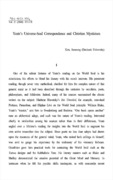

-
 * 본 문서는 배포용으로 복사 및 편집이 불가합니다.
* 본 문서는 배포용으로 복사 및 편집이 불가합니다.
미리보기
서지정보
· 발행기관 : 한국예이츠학회
· 수록지 정보 : The Yeats Journal of Korea / 21권
· 저자명 : Kim, Jooseong
초록
예이츠는 일생에 걸쳐 그의 문학과 그의 신비주의적 관심을 함께 연결시키려고 노력해왔으며 이는 사후의 세계와 우주의 섭리, 천국과 지옥의 실체 등 인간이 인식하지 못하는 것들에 대한 지적 호기심이며 창조적 탐구의 과정이었다. 이런 신비한 것에 대한 관심의 직접적인 접촉은 물론 블레이크적인 접근이었지만 그 뿌리를 거슬러 올라가면 크게 몇 가지로 분류되는데 이는 철학적 접근, 밀교적 접근, 아일랜드의 신화전설, 낭만주의적 접근, 신학적 접근, 그리고 이 논문에서 언급된 고대 기독교적 접근 등이 그것이다. 기독교적 접근이라고 분류되는 것은 성경에 기초한 교조적인 해석이 아니라 어느 정도 신비주의적으로 기독교의 전통에 따라 보이지 않는 것들, 즉 사후의 영적 경험과 천국과 지옥의 존재의 증명 시도를 의미한다. 예이츠의 기독교 신비주의에 영향을 끼친 두 신학자는 스웨덴보리와 보엠이 있다. 예이츠는 스웨덴보리로부터 주로 사후의 세계에 대해 영향을 받고 있다. 비록 스웨덴보리가 기독교의 교리에서 벗어나지 못했다는 약점에도 불구하고 사후세계의 존재인식과 인간과 신, 혹은 우주가 통신한다는 개념들은 예이츠의 인간영혼의 불멸성과 거대기억의 이론에 직접적인 근거가 된다. 그의 중심사상은 자연계와 영계의 통신이며 이는 우주와 개인, 신과 인간, 사후의 세계와 현세, 귀신과 사람간의 연결이며 합일이다. 영적인 세계는 천당이나 지옥이 아니라 그 중간의 세계이며 죽은 영혼들이 윤회로 다시 태어나거나, 혹은 최종의 목적지에 도달하기 전 잠시 머무는 임시영역이다. 예이츠는 이 영역에서 아니마 문디가 정화되고 거대기억이 형성된다고 보았다. 따라서 이 영적인 세계에서는 우주와 인간의 영혼이 서로 통신하며 실제로 교류할 수 있다는 것이다. 보엠은 좀 더 인간에 관심을 가지고 있다. 그의 인간과 신의 합일사상이 블레이크의 신성인간이며 예이츠의 황금새벽의 이상형이다. 우주의 질서와 조화를 강조한 보엠은 예이츠에게 시적 상상력이 신성과 같은 단계이며 시인은 마치 영매처럼 우주와 영혼, 즉 인간의 세계와 신의 세계를 볼 수 있는 능력을 가진 견자(seer)이며 연결할 수 있는 통신자(correspondences)라는 것을 말해주고 있다.영어초록
To complete his readings on the World Soul, which is a mysterious force behind unknown world to human, Yeats turns to many different kinds of occultists, poets, philosophies and folklorists. Among these, Yeats concentrates on two old Christian mystics, Emmanuel Swedenborg and Jacob Boehme, through the guide of William Blake. Those two Christian philosophers are not traditional doctrinaires sticking to the Bible. Swedenborg describes the world of after-life, and explains that the universe, or god, correspond to the soul, or human. Yeats's own poetic use of correspondence and his later vision of Anima Mundi as the realm of discarnate intelligences who have carried with them all their earthly memories and who communicate with the world of living is clearly indebted to Swedenborg's theory. His reading of Swedenborg is a crucial influence, for it is largely responsible for his shift from a World Soul model based on the mind and memory of Nature to that based on a dramatic and personalized realm, now termed the Anima Mundi. Yeats was interested in the Urgrunt, or basic ground of all being, and Boehme's theory of dialectical opposition in the Godhead between the light and dark natures, engaged in a fruitful complementary. Boehme's notion of the incarnation as taking place within all humanity must have appealed also to Yeats with its echo of both Blake's divine humanity and the Golden Dawn belief in the higher self.참고자료
· 없음태그
-
자료후기
-
자주묻는질문의 답변을 확인해 주세요

꼭 알아주세요
-
본 학술논문은 (주)코리아스칼라와 각 학회간에 저작권계약이 체결된 것으로 AgentSoft가 제공 하고 있습니다.
본 저작물을 불법적으로 이용시는 법적인 제재가 가해질 수 있습니다. -
해피캠퍼스는 구매자와 판매자 모두가 만족하는 서비스가 되도록 노력하고 있으며, 아래의 4가지 자료환불 조건을 꼭 확인해주시기 바랍니다.
파일오류 중복자료 저작권 없음 설명과 실제 내용 불일치 파일의 다운로드가 제대로 되지 않거나 파일형식에 맞는 프로그램으로 정상 작동하지 않는 경우 다른 자료와 70% 이상 내용이 일치하는 경우 (중복임을 확인할 수 있는 근거 필요함) 인터넷의 다른 사이트, 연구기관, 학교, 서적 등의 자료를 도용한 경우 자료의 설명과 실제 자료의 내용이 일치하지 않는 경우
“The Yeats Journal of Korea”의 다른 논문도 확인해 보세요!
-
Deirdre Toomey, Yeats and Women. (London: Macmillan Press Ltd, 1997. 4.. 3 페이지
-
Reading Yeats’s Letters Written in France 27 페이지
예이츠(W. B. Yeats)는 평생 프랑스, 파리를 10여 차례나 방문하여, 길게는 46일간 체류하면서, 많은 문인들과 신비주의자들과 교류하고, 공연을 보고, 작품을 쓰거나 구상하며, 대마초 -당시는 불법이 아니었지만- 를 피우기도 한다. 그러나, 흥미롭게도, 그가 장기간 머물고 있던 때는, 자신의 평생의 연인인 모드 곤이 파리에, 혹은 노르망디에 거주하.. -
Learning the ideal strategy of unification from two Irish poets, W. B... 20 페이지
아일랜드와 우리 대한민국은 거의 같은 시기인 20세기 초반에 독립운동이 있었고 또한 20세기 중반이라는 거의 같은 시기에 공화국의 형태로 재탄생했지만, 아직까지 국토의 완전한 회복이 이루어지지 못하고 서로 다른 국가나 체제로 분리되어 있으면서 통합된 한 국가가 되려는 꿈을 버리지 못하고 있다. 아일랜드의 통합은 종교, 인종, 정치 문화적 색채의 차이점 때문.. -
예이츠의 「청금석 부조」와 예술가의 비전 19 페이지
-
「청금석 부조」의 “비극적 환희”와 불교 19 페이지
문서 초안을 생성해주는 EasyAI

